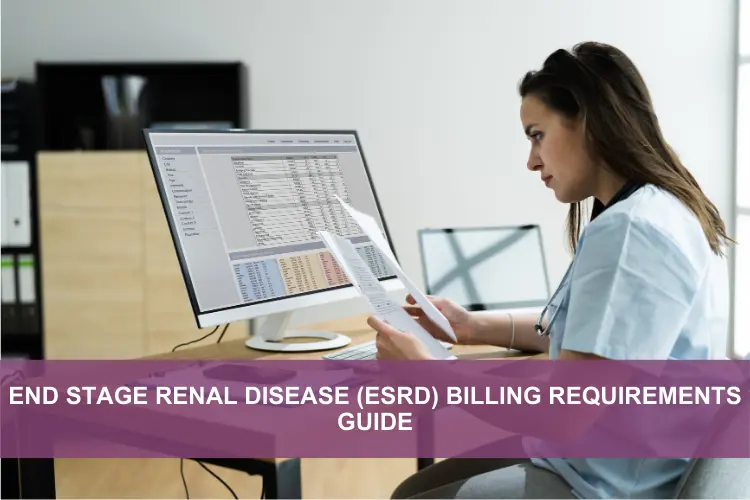Billing for End Stage Renal Disease (ESRD) can be complex, but applying it correctly is more important for ensuring patients receive the care they need without unnecessary financial stress. According to the United States Renal Data System, over 785,000 Americans are living with ESRD, with nearly 500,000 requiring dialysis.
Medicare Part B usually covers 80% of dialysis treatment costs, which pays the remaining 20%. It helps keep these out-of-pocket expenses low for patients. Understanding each specific code and using modifiers like Modifier 71 correctly can make a big difference in making the billing process smoother and more precise.
Effective billing can also help reduce the $120 billion spent annually on ESRD treatment in the U.S. This guide breaks down the crucial CPT codes and modifiers you’ll encounter in ESRD billing.
Essential Billing Codes and Modifiers
Accurate billing is crucial for proper reimbursement and compliance when treating End Stage Renal Disease (ESRD). Using the right codes and modifiers is important to ensure ESRD treatments are billed correctly.
Dialysis Billing Codes
| CPT Code | Description |
| Q4081 | This code bills for epoetin alfa injections essential for treating anemia in ESRD patients. |
| 90999 | Use this code for dialysis procedures that don’t have a specific designated code. |
| Rev Code 721 | This code covers dialysis services conducted within a hospital. |
| Modifier 71 | Use this modifier for dialysis services carried out in an outpatient setting. |
Specific Codes and Their Applications
Using the correct billing codes for ESRD treatments is key to ensuring the billing process is accurate and efficient. Here are some important codes and how to apply them.
Q4081 and Its Usage
The code Q4081 is used to bill for epoetin alfa injections, a crucial medication for managing anemia in patients with ESRD.
| CPT Code | Purpose | Application |
| Q4081 | Bills for epoetin alfa injections essential for treating anemia in ESRD patients. | Ensure accurate documentation to avoid claim denials. |
Occurrence Codes 51 and 94
These codes are used to document specific events in ESRD billing.
| CPT Code | Description | Importance |
| Occurrence Code 51 | This code records the date of the first dialysis treatment. | This helps establish the start date of treatment and coverage periods. |
| Occurrence Code 94 | Record the date when symptoms or the illness first appeared. | This is crucial for monitoring the timeline of a patient’s care. |
Rev Code 721 and Its Significance
Rev Code 721 is used for dialysis billing services provided in a hospital.
| CPT Code | Purpose | Application |
| Rev Code 721 | This code standardizes the billing process for dialysis treatments provided in hospitals. | Using these codes correctly ensures that hospitals get properly reimbursed. |
ESRD Medicare Billing Requirements
Medicare billing for ESRD follows specific codes and guidelines to guarantee correct reimbursement and compliance. This section delve
Diagnosis Codes for ESRD
Accurate diagnosis codes are crucial for clearly identifying the specific conditions of ESRD patients. Here are the key codes you should use:
| CPT Code | Description |
| N18.31 | Chronic kidney disease, stage 1. |
| N18.6 | End Stage Renal Disease (ESRD). |
| N18.9 | Chronic kidney disease, unspecified. |
| N18.32 | Chronic kidney disease, stage 2. |
UB04 Value Codes 48 and 49
UB04 value codes provide additional information about ESRD billing.
| CPT Code | Description |
| 48 | Hematocrit level at the last outpatient visit before the start of the billing period |
| 49 | Hemoglobin level at the last outpatient visit before the start of the billing period. |
Laboratory Values and Expected Value in ESRD Billing
Accurate documentation of laboratory values is crucial in ESRD billing to ensure proper treatment and reimbursement.
Expected Lab Values
Understanding the expected lab values for ESRD patients aids in precise billing and effective patient management. Here are the key lab values to keep in mind:
| Lab Test | Expected Value |
| Haemoglobin | 10-12 g/dL |
| Hematocrit | 33-36% |
| Serum Creatinine | Elevated levels, with specific values varying based on the patient’s condition. |
| Blood Urea Nitrogen (BUN) | Usually higher than normal, these levels are monitored to evaluate the effectiveness of the dialysis treatment. |
Conclusion
Getting billing right for “End Stage Renal Disease (ESRD)” is crucial for proper reimbursement and compliance. By knowing and using the correct codes and modifiers, healthcare providers can make billing more efficient and improve patient care management. Key codes like Q4081, Rev Code 721, and Modifier 71 are essential for accurate billing and minimizing patients’ out-of-pocket costs. Proper documentation of diagnosis codes and lab values is also vital. This guide gives you the access info to handle ESRD billing effectively.
FAQs
Q1: What is the primary code for billing epoetin alfa injections in ESRD patients?
The primary code is Q4081, used for billing epoetin alfa injections to treat anemia in ESRD patients.
Q2: How does Medicare Part B cover dialysis treatment costs?
Medicare Part B covers 80% of dialysis treatment costs, with the patient responsible for the remaining 20%.
Q3: What is the significance of Rev Code 721 in ESRD billing?
Rev Code 721 is used for billing dialysis services provided in a hospital setting.
Q4: Why is Modifier 71 important in ESRD billing?
Modifier 71 indicates dialysis services performed outside a hospital setting, ensuring correct billing.
Q5: Which ICD-10 code represents End Stage Renal Disease?
ICD-10 Code N18.6 represents End Stage Renal Disease, detailing the extent of kidney damage.



